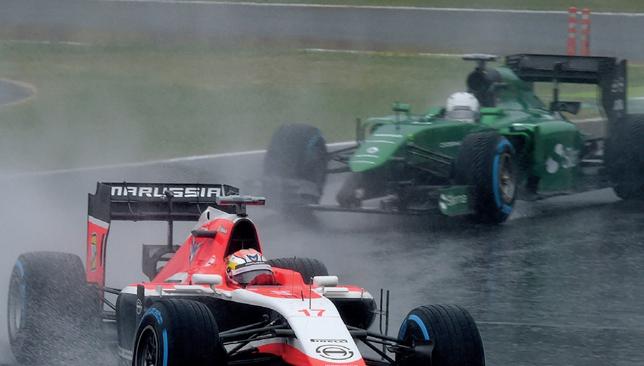
Marussia and Caterham “may not be the last” Formula One teams to go bust given the incredibly high cost of Grand Prix racing, the former head of world motorsport’s governing body believes.
Anglo-Russian outfit Marussia yesterday became the second team in four days, following Caterham, to enter administration.
Marussia, whose lead driver Jules Bianchi is fighting for his life after a crash at the Japanese Grand Prix, will miss the US Grand Prix on Sunday while administrators look for new finance.
Administrators took over the Caterham team on Friday and they will also miss the US race in Austin, Texas and the following Grand Prix in Brazil while they too go in search of new owners.
Max Mosley, the former president of the International Automobile Federation (FIA), told BBC Radio Five he was saddened but not surprised by recent events.
“It’s not a fair competition any more,” he said. “The big problem is that the big teams have so much more money than teams like Caterham and Marussia,” the 74-year-old added. “In the end, they were bound to drop off – and they may not be the last,” said Mosley, who headed up the FIA from 1993-2009.
According to the BBC, leading teams such as Red Bull, Ferrari and Mercedes spend more than $323 million (Dh1.1bn) each per year on their Formula One programmes.
By contrast, Marussia and Caterham, perennial backmarkers since entering the sport in 2010, manage on less than a third of that sum.
Mosley’s plans for a cost cap in 2009 were rejected and a similar scheme designed to take effect from next season fell through earlier this year.
However, Mosley said the present system was unsustainable, especially as the absence of Marussia and Caterham will leave only nine teams and 18 cars on the grid in Austin.
“From a sporting point of view, the sport should split the money equally and then let the teams get as much sponsorship as they can,” said Mosley. “A team like Ferrari will always get more sponsorship than Marussia, but if they all get the same basic money, then they all start on a level playing field, particularly if you have a cost cap where you limit the amount of money each team is allowed to spend.”
Mosley says it was no coincidence that Marussia and Caterham had experienced financial meltdown this season, following the introduction of environmental-friendly engines at double the cost of previous units.
“I’m in favour of the greener engines,” he said.
“The mistake was not saying to the big manufacturers that you can spend as much as you want on research but the maximum you can charge per season is something like £3-4m (Dh17.7m-Dh23.7m) instead of the £15-20m (Dh88.8m- Dh118m), which I believe it is now.”
Earlier yesterday, administrators FRP Advisory, who now control Marussia, said that the team’s existing shareholder was “unable to provide the required level of funding.”
Following Austin, there are two further rounds of the championship remaining, in Sao Paulo and Abu Dhabi. Marussia are unlikely to make it to Brazil, however, as all the cars are being transported by air straight from Austin to Sao Paulo.
Marussia started out as Virgin Racing but Russian sports car maker Marussia and owner Andrey Cheglakov became a key shareholder. The Russian car maker closed in April of this year.